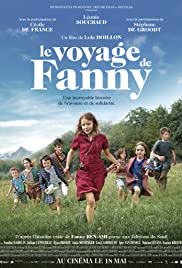
LE VOYAGE THE FANNY/FANNY'S JOURNEY
France, 2016, 94 minutes, Colour.
Leonie Souchaud, Fantine Harduin, Juliane Lepoureau, Ryan Brodie, Anais Meiringer. Meyer injure, Cecile de France, Stephane De Groodt.
Directed by Lola Doilon.
Fanny’s Journey is a rather late entry in films about World War II, the Holocaust, the taking of Jewish parents, care for the children by local French, the continued need for escape – and refuge in Switzerland.
The film is been directed by Lola Doilon, the daughter of distinguished French director Jacques Doilon.
Leone Souchard show is very good as the young Fanny, one a group of children who are fostered, corresponding with their mother for several years, then denounced, having to move, having to keep on moving – and the woman in charge of the escapes, played by Cecile de France, putting Fanny in charge, making to her demands on her sense of responsibility and her ability to lead the children to safety. Clearly, there is quite some suspense as the children are small, required not to give out information, not to tell people their real name, suffer from hunger and thirst, from fatigue, but continue their quest.
German troops are seen and there is always a risk, especially the Germans requisitioning a farm of a man who is shielding the children.
However, while the film is a true story, and it is said about the children not seeing their parents again, it is a story of valiant children, courage and enterprise.
1. A World War II story? Jewish persecution? France? Family shielding and saving children?
2. 1943, the situation in France, parents taken and arrested, children entrusted to families? The towns, the homes, the way of life? The dangers? Moving from one house to another? Homes, play, the dormitories? The effect on the children?
3. The French countryside, the towns, train rides, the cities? The countryside, the mountains? The French- Swiss border? The musical score?
4. The focus on Fanny and her sisters? Their ages? The farewell from their mother? The letters from daughters to mother, mother to daughters? Their dependence on each other? Fanny the oldest? The relationship with the other children? The sympathetic parents?
5. The German occupation, the French police, collaboration? Denunciations? The consequences?
6. The children moving, cars and trains? Madame Forman? Strict? If the children? Receiving them, the dormitories, the discipline? Fanny and her work with the boy, the vegetables, his comic touches, listening to the radio? The denunciation? Having to move?
7. Madame foreman, the dangers of the railway station, the documents, the distracting the police and fainting? Getting the children on the train? The reappearance, putting Fanny in charge? Never seen again? (A character based on a real life woman who saved many children?)
8. The different children, boys and girls, Victor and his difference, aloofness, his criticisms of Eli, especially when he won went from the train? Diane, being mute? Her sister? The boys and the girls? In the train, and his leadership, her lacking in confidence, urge to rise to the occasion?
9. Eli, Leaving, his being caught, the letter?
10. The dangers, the police, in custody, no food, little boy and his defiance of the police, urging them to shoot him? The open door? The escape?
11. Into the countryside, the help, the cover of the summer camp, running to the top of the hill, through the forest? The effect on the children, hunger, thirst, fatigue? The water, the berries? Finding the hut, staying there?
12. Fanny going to the town, the man helping, the health of the children?
13. Jean the farmer, his help, the Germans coming to requisition his farm? Taking them in the wagon, explaining the border? The running across, the hole in the fence, the no man’s land, Fanny going out to retrieve the child, zigzagging in her running as Eli had advised, to safety?
14. The 21st century tribute to the parents, to the children and, especially, to those who saved them?